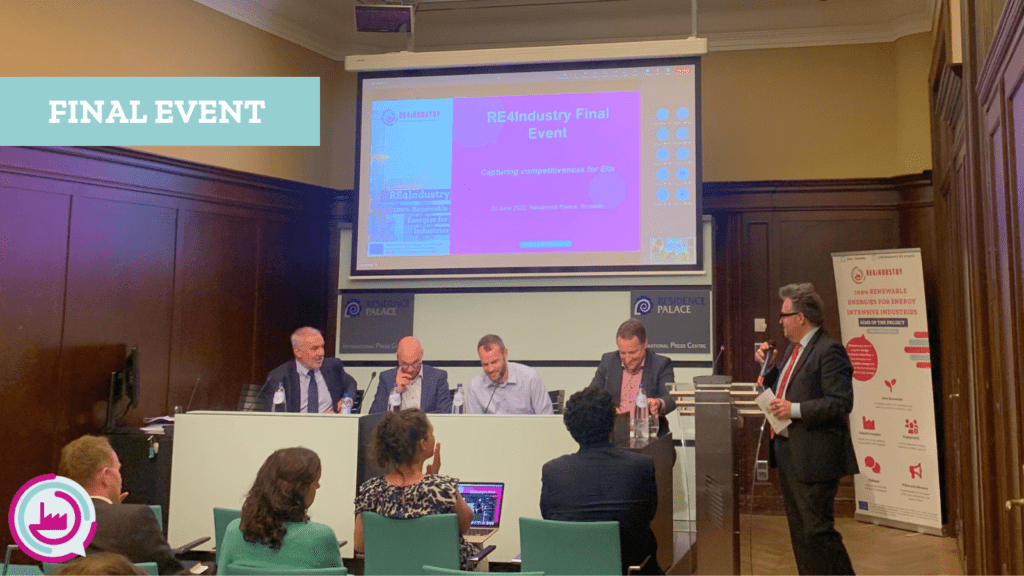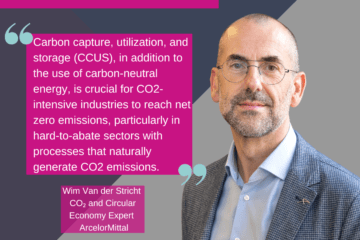Last week, RE4Industry held its final event in the margins of the European Sustainable Energy Week, at the Residence Palace, Brussels. It brought together about 50 experts to discuss the future of the European Industry, taking into account the decarbonisation plans set by the European Union.
Alessandro Polito, representing DG Energy, gave the introductory speech and mentioned the importance of renewables, crucial to fighting climate change and creating jobs, growth, and boosting innovation and competitiveness. Hoping that the inclusion, for the first time, of the industry in the Renewable Energy Directive, introduces a new way of looking at RE and accelerates the transition, Alessandro Polito also highlighted that, if we really want to achieve carbon neutrality, we need to speed up and update our renewables, given that currently 91% of the energy consumption from the industry still comes from fossil fuels.
From RE4Industry side, the session proceeded with Olgu Birgi and Anatoli Rontogianni presenting an overview of RE in the framework of the project, and some of the successful cases implementing RE studied over time, respectively.
Diego Redondo, from RETROFEED – a Horizon2020 project sharing the same synergies and with which RE4Industry has a collaboration agreement, proceeded to present the concept and some of their preliminary results, namely the 12% reduction on CO2 emissions the project reached already with the solutions developed, “The impact calculated at the beginning of the project is looking like manageable and close to what we think will be the results of the project now that we are approaching its end”, added the project coordinator.
At the roundtable, “Success cases and remaining challenges – views from the sectors”, to which the following speakers participated:
- Jorge Mendonça e Costa, APIGCEE
- Timo Gerres, Instituto de Investigación Tecnológica (IIT)
- Diedert Debusscher, Copper Alliance
- Frank Ohnemüller, FG Kalk

An engaging discussion took place, giving the audience a chance to participate and ask some questions as well. From it, a few thoughts are taken below:
⚡ Not all industries are able to shift their production places, the ones with heavy raw material needs, for instance, can’t shift and, for those, the infrastructure topic is crucial;
⚡ A lot of industries have identified electrification as a good solution to decarbonise but unfortunately is still not happening on one side because we need to upscale and there’s a need for support;
⚡ If we really want to move forward towards EU decarbonisation we need a circular single market and a common industrial policy, which means all companies across the EU have a fair chance to decarbonise;
⚡ Instead of investing millions in transforming some industries to accommodate renewable energies, reinvest in plans of moving some of these industries to countries like Portugal and Spain where these sustainable solutions are available could be a solution;
⚡ There won’t be decarbonisation without competitive renewable energy prices, and for that, we need stable prices, because companies can’t plan ahead in a volatile energy market;
⚡ Companies are already doing an important effort to accommodate decarbonisation, by investing and already reaching some important marks.
Finally, Brigitte Hasewend from ESEIA, one of the consortium members of RE4Industry, identified some conclusions from the session and highlighted the fact that, even though decarbonising the Energy Intensive Industry sector in Europe is a big challenge, there are a lot of common aspirations, connected, and working towards the same goal. Moreover, Brigitte mentioned the need to have a legal system and to encourage future transformation from the legal point of view, as well as the importance of educating the civil society in such matters and how they could contribute by supporting the change because achieving decarbonisation depends on all of us.
Find here the presentations from the final event.
